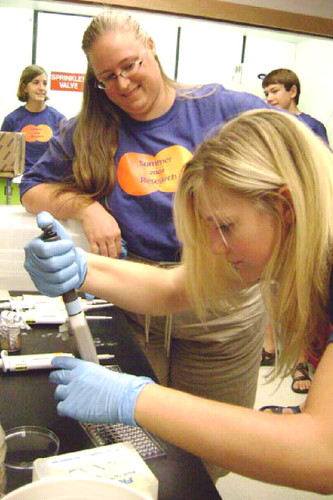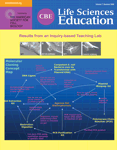Phoebe Lostroh
Abstract
Note from the Editor
Educator Highlights for CBE—Life Sciences Education show how professors at different kinds of institutions educate students in life sciences with inspiration and panache. If you have a particularly creative teaching portfolio yourself, or if you want to nominate an inspiring colleague to be profiled, please e-mail Laura Hoopes at Pomona College, [email protected].
LH: Phoebe, what was your most exciting experience in teaching at Colorado College?
Lostroh: I would have to pick my first-year course on microbiology given two years ago. I had 16 students who were very well prepared in biology. This was a general education course given in the context of learning about microbiology. We did a lot of work to develop general education skills without worrying about whether I could “cover” all of the standard microbiology material. You know Colorado College is on the block plan—the students only take one course at a time, and that course takes up both morning and afternoon for about a month. This course was two blocks long, and I really got to know the students. I also got them their first year, before they were blasé about the block plan. We got away from routine—I asked them to do real investigations in the lab instead of cookbook work. I worked hard to choose some primary literature for introductory students so that I wouldn't have to overwhelm them with biology Just-In-Time learning for them to understand the paper.
LH: Tell me about a paper that you used.
Lostroh: One paper was on how Vibrio cholerae becomes competent naturally when it is exposed to chitin. The paper included numeric data, which challenged some students, and of course I had to explain the nomenclature for mutant and wild-type strains. It's amazing how few science papers are well written in the general education sense or make any kind of an argument. I had to look a long time to find suitable papers.
LH: It sounds like teaching prospective scientists how to present and defend an argument is very worthwhile!
Lostroh: Yes, I hope so. I still have some of those students in classes, and their ability to analyze and understand science is quite impressive.
Foreground, Sarah Puhr, Biology 2008, and Phoebe Lostroh. In back, from left to right, are Sara Roggensack, Biology 2009, and Nik Evitt, who started high school in 2007–2008.
LH: Have you taught the same type of class before or after that particular best experience?
Lostroh: Yes, I've been here 4 yr. I've taught a course like this in either a one- or two-block version every year. Once I taught two sections of the course, in one block each.
LH: Have you ever taught a very large class?
Lostroh: No, my largest class here enrolled 24 students. Elsewhere, 53 students was my maximum class size. So I'm well adapted to teach here. I love the close contact with the students.
LH: Tell me more about the general education skills you taught in that first-year class.
Lostroh: I need to teach the students that the hardest part of their job is not learning facts, it's figuring out how to tell whether a person is even making an argument. Many scientists think the data speak for themselves, and they don't put the argument into words. That's why I'm so selective in the primary literature I use. If the authors are making an argument, then evaluating the strength of the argument becomes the students' job. It all works together with teaching them to write using arguments themselves. Writing skills are so undervalued in science. Many of my students are not planning to be professional biologists. I feel that working on those general skills is the best thing I can do for all of the students, prebiologists or not.
LH: Do you only use articles from the primary literature in this type of class?
Lostroh: No, I wanted to do that. But I've been pushed by the low availability of good arguments in the literature to use articles in American Scientist, Scientific American, and Atlantic Monthly. The writing is good, the papers make arguments, and the facts are more accessible for first-year students as well. But it's the writing that matters most to me. I'd be glad to use primary literature alone if only the papers were written better.
LH: What else do you teach?
Lostroh: I teach a seminar on critical evaluation of primary literature in molecular biology for seniors. I ask each one of them to “adopt” a laboratory that has published papers they enjoy reading and to pretend that they're going to join that group. I have the students write a detailed research proposal “addressed” to the leader of that group, sort of like a grant proposal. Often, I see papers months later in J. Bact. [Journal of Bacteriology], presenting experiments virtually identical to those my students proposed. The intense methods of molecular biology can be so intimidating when first introduced. It's been really wonderful to see the students—especially the women—learn that they can understand and deal with the methods and plan excellent experiments to address a research question. They are no longer intimidated by the end of the course.
LH: Thanks for sharing your ideas about education with CBE-LSE readers, Phoebe.



